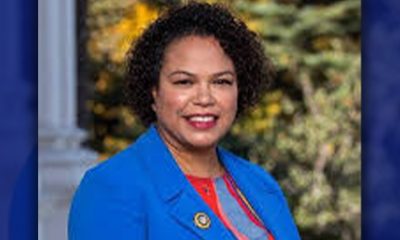Activism
To Address Rising Hate, More Focus on Prevention and Crime It Triggers
According to the FBI, over 10,000 people nationally reported to law enforcement in 2021 that they were victims of hate crimes because of their race or ethnicity, sexual orientation, gender, religion or disability. Hate is on the rise in California. For example, there was a 6% increase in hate crimes and hate incidents in Orange County from 2020 to last year.

By McKenzie Jackson | California Black Media
Although Black people are still primary victims of hate crimes and hate speech, hate speech of any kind is hurtful at the least and condones activity that can be dangerous.
Last month, two Black icons engaged in what was considered hateful speech.
Hip hop icon and fashion designer Kanye West wore a black, long-sleeved shirt with “WHITE LIVES MATTER” emblazoned on the backside in white block letters at his Yeezy fashion show in Paris on October 3, kicking off a national conversation on racism that intensified four days later when West broadcast on Twitter that he was going to go “death con 3 On JEWISH PEOPLE” in a since-deleted tweet.
Then, on October 27, NBA player Kyrie Irving posted a link on Twitter to the 2018 film “Hebrew to Negroes: Wake Up Black America,” and shared a screenshot on Instagram of the film’s rental page on Amazon.
The film, directed by Ronald Dalton Jr., who also wrote a 2014 book under the same name, contains antisemitic tropes disparaging Jewish people. The film also claims the Holocaust never happened.
For both men, the national outcry led to swift censure.
West, who changed his legal name to Ye, was barred from Twitter and Instagram and lost his partnership with Adidas. He reluctantly apologized on October 19.
Irving was suspended for several games by the Brooklyn Nets for refusing to say he has no antisemitic beliefs and Nike suspended his shoe contract. Irving has apologized for his social media actions, and discussions on biased hate in the U.S. have been heightened.
Los Angeles Lakers star Lebron James said on November 6 that Irving was in the wrong.
“Me, personally, I don’t condone any hate of any kind,” James told the media. “To any race. To Jewish communities, to Black communities, to Asian communities.”
According to the FBI, over 10,000 people nationally reported to law enforcement in 2021 that they were victims of hate crimes because of their race or ethnicity, sexual orientation, gender, religion or disability.
Hate is on the rise in California. For example, there was a 6% increase in hate crimes and hate incidents in Orange County from 2020 to last year.
Of the 398 bias-motived activities, Black people were the target of 25 incidents and 16 crimes, according to the “2021 Orange County Hate Crimes Report” released by Orange County Human Relations Council on September 15.
Don Han, the Council’s director of operations, said the trend is concerning.
“Orange County has 2% African Americans in the demographic, so a very small percentage, but in terms of hate crimes they are within the top three,” Han said. “That speaks volumes for us, and that is something very intentional for us in how we support the community here in Orange County, so that people can feel that they belong.”
A hate incident is an action or behavior motivated by hate but legally protected by the First Amendment right to freedom of expression. A hate crime is an illegal action committed against an individual, group, or property motivated by the victim’s real or perceived protected social group.
Overall, there were 97 documented hate crimes in Orange County and 301 reported hate incidents a year ago. A large swath of the incidents in 2021 — 153, a 164% increase from 2020 — were against Asian/Pacific Islanders. Sixteen crimes were committed against gay men, while 26 of the crimes had an unknown bias.
The rise in hate crimes and incidents in the Southern California county is part of a broader pattern around the Golden State.
A report released by California Attorney General Rob Bonta in June revealed hate crimes inspired by racism and homophobia resulted in a 33% uptick in reported incidents in the state in 2021.
Hate crimes against Blacks were the most prevalent, according to the state report. There were 513 crimes committed against Blacks in 2021, 13% more than the 456 in 2020. Overall, there were 1,763 crimes reported in 2021. Crimes spurred by sexual orientation bias jumped from 205 in 2020 to 303 in 2021.
Crimes involving religion bias increased from 180 in 2020 to 218 last year. Crimes involving a gender bias decreased to 54 in 2021 from 62 in 2020.
Gov. Gavin Newsom signed Assembly Bill 2282, meant to crack down on hate crimes and protect minority communities in California, on September 18. The bill equalizes and strengthens penalties for using hate symbols and bolsters security for targeted religious and community-based nonprofits.
“California will not tolerate violence terrorizing any of our communities, and this measure updates state law to punish the use of universally recognized symbols of hate equally and to the fullest extent of the law,” Newsom said. “California will continue to lead the fight to stamp out hate and defend those under attack for who they are, how they identify, or what they believe in.”
The legislation brings parity to penalties for burning crosses and using swastikas and nooses. Using a noose as a hate symbol currently has the lightest penalty of the three while cross-burning is the most highly penalized. People who use any of the three symbols of hate will be subject to the strongest of these criminal penalties under the signed bill.
Assemblymember Rebecca Bauer-Kahan (D-Orinda), AB 2282’s author, said hate symbols are violent and terrifying.
“With hate crimes increasing across the state, it is critical to recognize the power and destructiveness of these symbols, and restrict their use equally,” she said.
On August 21 Krishnan Jayaraman, who is Indian, was in a Taco Bell in Fremont when Singh Tejinder hurled anti-Hindu comments and racists slurs at him. Tejinder used the N-word several times, called Jayaraman a “dirty Hindu,” and seemingly twice spit at Jayaraman.
Tejinder, who is Asian/Indian, was charged by Fremont police with a hate crime in violation of civil rights, assault and disturbing the peace by offensive language.
Han of the OC Human Relations Council said his group attempts to prevent hate activities in the county by organizing educational programs with schools and other organizations.
“We work with different communities on hate crime prevention and on how to report a hate crime and hate incidents,” he said. “We work with law enforcement. If they are responding to a hate crime, and the victim speaks a language other than English, we are able to connect them with organizations that we partner with to make communication possible.”
Reena Hajat Carroll, executive director of the California Conference for Equality and Justice (CCEJ) in Long Beach, said racism and bigotry are big problems in California.
CCEJ battles prejudice via workshops and trainings in schools, and with its restorative youth diversion program, meant to be an alternative to the juvenile justice system.
“CCEJ’s work with young people is key,” said Carroll. “It creates a generation of people who know how important it is for us all to fight bias, bigotry, and racism. No matter what age, no matter what race, etc. We have to all be in this together because the problem is too pervasive.”
Han said the best way to prevent hate activities is education and for to people get to know each other.
“We have created a safe space to have conversations, so hopefully those conversations will create common ground,” he said. “If you know someone as a person or another human being, when you truly know me and we know each other, it’s harder to have bias-motivated feelings.”
For more information on hate crimes and resources victims, visit https://oag.ca.gov/hatecrimes.
This report was supported in whole or in part by funding provided by the State of California, administered by the California State Library.
Activism
Oakland Post: Week of November 26 – December 2, 2025
The printed Weekly Edition of the Oakland Post: Week of November 26 – December 2, 2025

To enlarge your view of this issue, use the slider, magnifying glass icon or full page icon in the lower right corner of the browser window.
Activism
Oakland Post: Week of November 19 – 25, 2025
The printed Weekly Edition of the Oakland Post: Week of November 19 – 25, 2025

To enlarge your view of this issue, use the slider, magnifying glass icon or full page icon in the lower right corner of the browser window.
Activism
IN MEMORIAM: William ‘Bill’ Patterson, 94
Bill devoted his life to public service and education. In 1971, he became the founding director for the Peralta Community College Foundation, he also became an administrator for Oakland Parks and Recreation overseeing 23 recreation centers, the Oakland Zoo, Children’s Fairyland, Lake Merritt, and the Henry J. Kaiser Convention Center.

William “Bill” Patterson, 94, of Little Rock, Arkansas, passed away peacefully on October 21, 2025, at his home in Oakland, CA. He was born on May 19, 1931, to Marie Childress Patterson and William Benjamin Patterson in Little Rock, Arkansas. He graduated from Dunbar High School and traveled to Oakland, California, in 1948. William Patterson graduated from San Francisco State University, earning both graduate and undergraduate degrees. He married Euradell “Dell” Patterson in 1961. Bill lovingly took care of his wife, Dell, until she died in 2020.
Bill devoted his life to public service and education. In 1971, he became the founding director for the Peralta Community College Foundation, he also became an administrator for Oakland Parks and Recreation overseeing 23 recreation centers, the Oakland Zoo, Children’s Fairyland, Lake Merritt, and the Henry J. Kaiser Convention Center.
He served on the boards of Oakland’s Urban Strategies Council, the Oakland Public Ethics Commission, and the Oakland Workforce Development Board.
He was a three-term president of the Oakland branch of the NAACP.
Bill was initiated in the Gamma Alpha chapter of Kappa Alpha Psi Fraternity.
In 1997 Bill was appointed to the East Bay Utility District Board of Directors. William Patterson was the first African American Board President and served the board for 27 years.
Bill’s impact reached far beyond his various important and impactful positions.
Bill mentored politicians, athletes and young people. Among those he mentored and advised are legends Joe Morgan, Bill Russell, Frank Robinson, Curt Flood, and Lionel Wilson to name a few.
He is survived by his son, William David Patterson, and one sister, Sarah Ann Strickland, and a host of other family members and friends.
A celebration of life service will take place at Henry J. Kaiser Convention Center (Calvin Simmons Theater) on November 21, 2025, at 10 AM.
His services are being livestreamed at: https://www.facebook.com/events/1250167107131991/
In lieu of flowers, donations can be made to the Euradell and William Patterson scholarship fund TBA.

-

 Activism3 weeks ago
Activism3 weeks agoOakland Post: Week of November 12 – 18, 2025
-

 Activism4 weeks ago
Activism4 weeks agoOakland Post: Week of November 5 – 11, 2025
-

 Activism2 weeks ago
Activism2 weeks agoIN MEMORIAM: William ‘Bill’ Patterson, 94
-

 Activism3 weeks ago
Activism3 weeks agoHow Charles R. Drew University Navigated More Than $20 Million in Fed Cuts – Still Prioritizing Students and Community Health
-

 Bay Area3 weeks ago
Bay Area3 weeks agoNo Justice in the Justice System
-

 #NNPA BlackPress3 weeks ago
#NNPA BlackPress3 weeks agoThe Perfumed Hand of Hypocrisy: Trump Hosted Former Terror Suspect While America Condemns a Muslim Mayor
-

 #NNPA BlackPress2 weeks ago
#NNPA BlackPress2 weeks agoTrump’s Death Threat Rhetoric Sends Nation into Crisis
-

 #NNPA BlackPress4 weeks ago
#NNPA BlackPress4 weeks agoProtecting Pedophiles: The GOP’s Warped Crusade Against Its Own Lies





















































